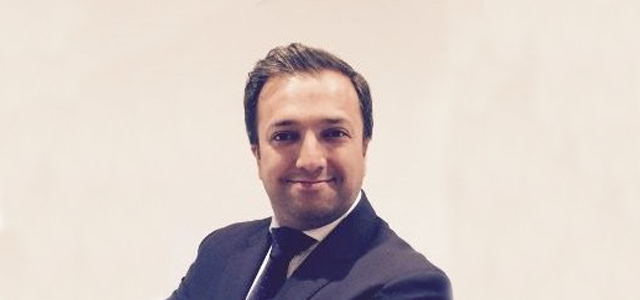Technology: large organisations losing to nimble start-ups

Businesses must learn fast, act quickly and scale rapidly or risk irrelevance. As Airmic launches its conference Tech Hub, Jessica Titherington talks to Fujitsu's Ketan Parekh about the latest technologies disrupting businesses and transforming risk management.
The rapid pace of technological advancements today can seem exciting, unpredictable and daunting in equal measure. Developments in Artificial Intelligence (AI) and the Internet of Things (IoT) are accelerating the convergence of physical and digital spaces, and in doing so they are completely changing the business landscape.
"The digital transformation of business models is now core to how we add value," says Airmic's chief executive, John Ludlow. "It's central to how we reinvent our purpose, organise our enterprises, our networks, supply chains, the products and services we offer and how we relate to our customers and other stakeholders."
This presents a dual challenge for the risk community: these changes are giving rise to unprecedented risks that we couldn't even imagine just five years ago. And yet the biggest risk of all is not to embrace technological innovation. "We need not fear concepts such as AI, Blockchain and Quantum Computing, but there will be losers as well as winners," Mr Ludlow adds. "The winners will be those organisations and individuals that acquire the necessary expertise, collaborate and embrace change."
Legacy systems are hindering innovation
In response to these challenges, Airmic has launched its conference Tech Hub - a cutting-edge exhibition feature and the first of its kind at an Airmic conference. Sponsored by Fujitsu, Airmic's technology partner, the Tech Hub will showcase some of the latest cyber, AI and cloud technologies available to businesses and risk managers.
Ketan Parekh, head of financial services and insurance for Fujitsu, is part of the team driving the Hub. He believes that larger and well-established companies must find a way to compete with nimble, start-up organisations centred around technology.
The financial services sector is a case in point, he says: "The introduction of new digital financial technology is changing how banking and insurance customers access services. Banks and insurers are now in competition with new non-bank start-up technology firms offering highly agile FinTech, solutions," he explains.
"With their lab and incubator capabilities and facilities they're able to leverage flexible development approaches, allow early exposure to new concepts and technologies, and push digital customer experience boundaries."
Because these disrupters are free from traditional legacy systems and constraints, and often operate in a less regulated environment, they have the ability to develop and deploy new connected solutions at speed.
"It's this agility, combined with their collective focus and willingness to experiment, that's enabling them to increase their market share," he adds. "The more traditional companies need to find ways to compete so as not to become irrelevant. They need to find ways out of their old legacy technology to become more agile themselves."
Real-time intelligence
One of the hot topics at the Tech Hub will be the growing need for real-time intelligence. Says Mr Parekh: "The days of collecting and controlling data centrally are numbered. AI and IoT across the ecosystem will autonomously learn from data and create insights."
AI has already proven more accurate that human experts, he says. And with its ability to identify patterns and detect anomalies from vast swathes of data, it is radically transforming many industries. "By creating a real-time dialogue between people, things and information, we are entering a hyperconnected era where AI can be applied in real, everyday business situations."
This has a direct application to risk management. Built-in intelligence sensors, advanced imagery technology and data apps are all enabling businesses to identify and monitor risks before an incident occurs and to assess damage in the immediate aftermath of an event. In the transport sector, for example, advanced image recognition technology can be used to identify faults on the track, thereby reducing risk and decreasing maintenance costs.
Visitors to the Tech Hub will have the chance to see many of these technologies in action, including evidential video technology designed to increase productivity, shorten claims lifecycles and aid decision making; cutting edge DNA security technologies; and the latest risk management software for data capture and analysis. On-site demos will include a flight simulator, a 360-degree security assessment, mobile and sensor-based RFID solutions, as well as the chance to interact with an intelligent chatbot.
Digital Co-Creation
The theme for the Tech Hub, chosen by Fujitsu, is Human Centric Innovation: Digital Co-Creation. Mr Parekh explains: "In a world of constant digital transformation, organisations need to learn fast, act quickly and scale rapidly. No-one can do this alone.
"'Co-creation' has always been central to Fujitsu's partnership approach but in a digital world, this becomes an imperative. It's about bringing together previously unconnected fields of expertise to realise innovation and value creation at scale."
By way of example, Fujitsu recently worked with a major renewable energy company to engineer an AI solution that uses machine learning to automatically detect flaws in the 5000 wind turbine blades it produces annually. In this industry, such flaws can prove catastrophic and inflict major reputational damage; however, manually testing each blade takes up to six hours. Not only did the AI solution achieve 100% coverage of all defects, it reduced manual scanning by 80%.
This notion of shared expertise is at the heart of the Tech Hub, according to Mr Parekh. "We want to celebrate technological advances; to show technology in action; and to demonstrate how the right blend of technology expertise and business insight can create true business value."

Ketan Parekh, head of financial services and insurance, Fujitsu
